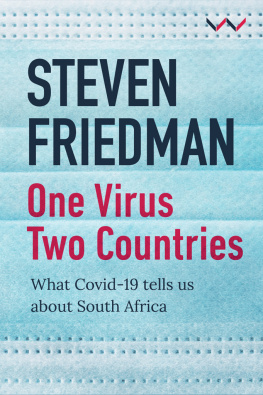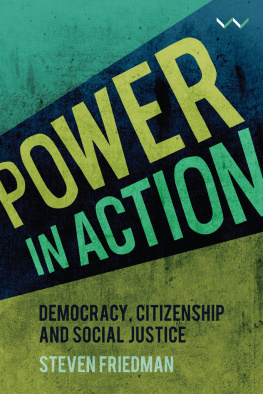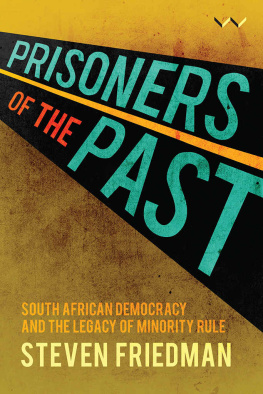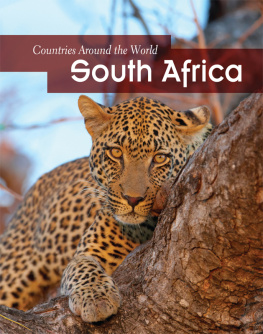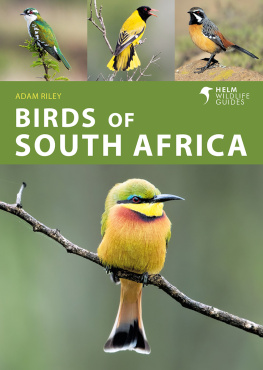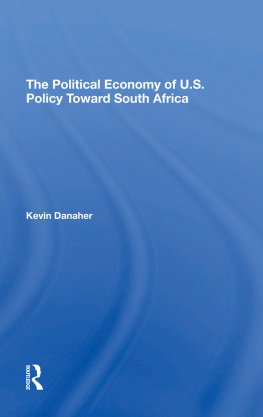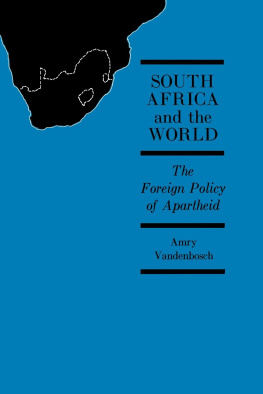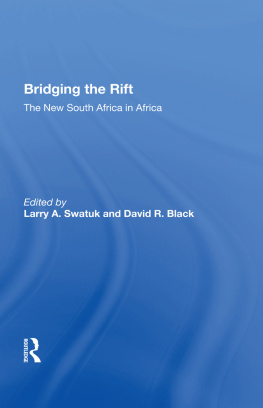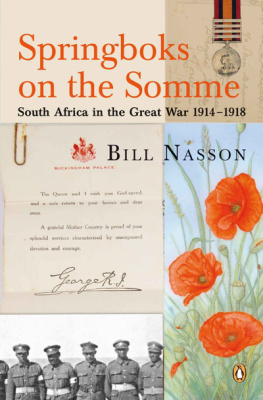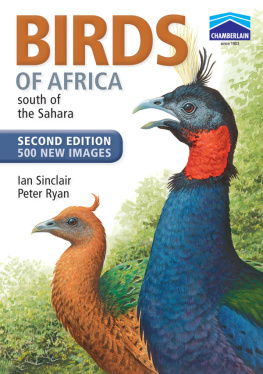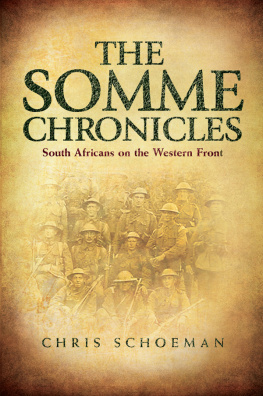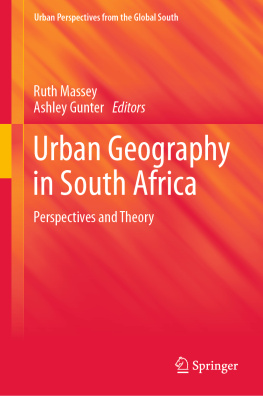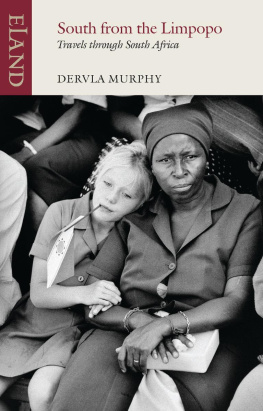Published in South Africa by:
Wits University Press
1 Jan Smuts Avenue
Johannesburg 2001
www.witspress.co.za
Copyright Steven Friedman 2021
Published edition Wits University Press 2021
First published 2021
http://dx.doi.org.10.18772/12021117434
978-1-77614-743-4 (Paperback)
978-1-77614-744-1 (Hardback)
978-1-77614-745-8 (Web PDF)
978-1-77614-746-5 (EPUB)
All rights reserved. No part of this publication may be reproduced, stored in a retrieval system, or transmitted in any form or by any means, electronic, mechanical, photocopying, recording or otherwise, without the written permission of the publisher, except in accordance with the provisions of the Copyright Act, Act 98 of 1978.
Project manager: Catherine Damerell
Copy editor: Lee Smith
Proofreader: Tessa Botha
Indexer: Marlene Burger
Cover design: Hybrid Creative
Typeset in 11.5 point Minion Pro
W hy take seriously a book on a pandemic written by a student of politics who has never studied medicine?
One of the mantras of South Africas official response to Covid-19 (and that of many other countries) was that we should respond to the virus by following the science. While this was an understandable response to an earlier failure to take science seriously the governments response to HIV and Aids during the early years of the twenty-first century it created its own problems, chief among them the assumption that there is an undisputed science of Covid-19 which is available only to medical scientists experts who are, therefore, infallible messengers of the revealed truth. This too was central to the way in which the countrys elites first responded to the disease. It ensured a slavish reverence for medical scientists, even when their claims appeared to ignore evidence available in the daily news, or were proved to be simply wrong, and served largely to close down public debate on the governments medical response to the virus. And, while some scientists complained incessantly that the government ignored their advice, they differed with it only on detail, not principle. Both presented the opinions of medical scientists as the science the only response to the pandemic based on knowledge.
But the fight against a public health threat is never only (and often not mainly) about access to medical science. If it was, South Africa would boast the lowest case and death numbers in Africa because it has more medical scientists and medical technology than other countries on the continent. But its case numbers and deaths are, in reality, the highest on the continent. Protecting public health is inevitably a social and political activity because it is, to a large degree, about how people behave; its goal is to encourage or force people to act in ways most likely to keep them alive and healthy. Medical science hopes to tell us how a health threat operates and what can be done to avoid it or to treat it. It cannot tell us how to ensure that people do what is required, whether those people are government ministers, those who wield private power over providing health care, or the citizenry.
To take but one example, which moved onto the agenda towards the end of 2020, medical science can develop a vaccine but decisions by political and economic power holders determine who enjoys access to it and politics may determine who is willing to take it. This point takes on greater urgency when there is no vaccine (for the vast majority of people) or cure and the only way to contain the virus is to prevent people spreading it. The role of government is essential and so is the relationship between government and citizens, whether this rests on mutual trust or the effective use of power by those in authority. Medical science helps keep the citizenry healthy but an approach which sees public health as a purely medical problem is certain to hide more than it reveals.
This reality was never recognised by the South African government. It did not appoint any social scientists to its Ministerial Advisory Committee (MAC), a choice which was criticised publicly in an editorial in the South African Medical Journal written by a researcher based at the Centre for the Aids Programme of Research in South Africa (CAPRISA) at the University of KwaZulu-Natal. Professor Salim Abdool Karim, who was chair of the MAC in 2020, is the long-time director of CAPRISA. Following the science clearly did not mean taking seriously anyone who studies society. Since one of the weaknesses in the countrys approach was a failure to understand the realities experienced by people living in poverty, this may have ensured that the governments approach was not as guided by science as it claimed.
Nor does it necessarily require knowledge of medical science to analyse public health programmes. Many of the claims which medical scientists make about pandemics are based on interpretations of data which are available to anyone who keeps up with the daily news. Karims response to Covid-19 was based on his claim that no country had avoided a severe epidemic. This makes a statement which can be understood and challenged by anyone who follows the news. The claim that those of us who challenge the opinions of scientists must be dismissed out of hand because we are amateurs claiming to be epidemiologists is an attempt to silence debate. No medical training is required to discover how many people in particular countries have tested positive for a disease and how many are officially reported to have died of it.
Scientific training is also not required to work out that scientists are, like judges who are also sometimes assumed to be infallible, human beings who have biases and prejudices like all other humans and that this might have as much to do with what they say about public health issues as with their scientific training. Precisely because public health is political, scientific opinions and disagreements between scientists are not principally a neutral report of, and debate on, the findings of experiments. It is impossible to say anything about public health without making assumptions about society, how it works and how it should work. And, since the way we view the world is often a product of our place in society, there is no reason why middle-class scientists should not share the prejudices of other middle-class people. Great harm may be done to society when we who have no medical training accept what scientists say without challenge when it seems to have more to do with their view of the world than their training or the research they undertake. It does not require training in medical science to detect scientists biases and to point out how these influence their opinions.
This is why this book assumes that the fight against Covid-19 can be best understood through political analysis. This may sound like the rejection of medical science which prompted some to deny the reality of HIV and Aids or which, currently, wishes away Covid-19 and the measures used to fight it, including vaccines. It is not. Medical science plays an important role in the fight against pandemics. When HIV became a key concern in South Africa, ignoring or rejecting scientific findings cost hundreds of thousands of lives in Brazil and parts of the United States, the same response to Covid-19 has had the same effect.
But, while medical science is indispensable in the fight against pandemics, success or failure depends on political decision-making. The core question raised by any societys response to a threat to public health is not whether it followed the science. Nor is it whether it prevented the health system from being overwhelmed. It is whether it ensured that as few people as possible fell ill and as few as possible lost their lives. This, in turn, is a product of who decides how and whether to fight the epidemic, on what criteria, and how able they are to translate intentions into action. These decisions and abilities to implement them are the products of politics and so it is a study of the politics of how countries or those who wield power within them responded to the virus which allows us to understand and assess how effectively they coped with (and are coping with) Covid-19. Since responses to pandemics rely on human behaviour, the nature of particular societies and the relationship between the authorities and those they govern is also crucial. How countries respond to pandemics tells us much about them.

